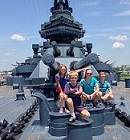Why would the US have risked almost the entire carrier forces afloat if they did not think they could win at Midway?
Immaterial to the discussion at hand. The original thrust was that the US player should not be rewarded for doing that which the JCS intended to do. Sit around and wait for a great opportunity to strike a blow. Midway was exactly such an opportunity. Unless you are going to require that the Japanese player send an understrength TF to a remote, substantially built up island with a potentially robust aircraft contingent, far from Japan's logistical bases, and also require that the Japanese player set all air units in that TF to "airfield attack," then it is inappropriate to demand action from the Allied player.
Every time this trivial notion comes up it is a transparent AF ploy to fabricate of whole cloth circumstances that merely generate VP for the Japanese player. Just admit that you want to handicap the Allied player and be done with all the badly informed notions about 'that which history requires.'
And why even attempt to thwart the Japanese at Coral Sea if the JCS could wait to take offensive until '43? The fact is they couldn't wait and events bore that out.
Your one sentence demonstrates a failure to understand Coral Sea. It was not an offensive operation. It was purely a defensive operation. The JCS DID in fact wait until 1943 to take the offensive in New Guinea.
Not to mention Doolittle or the Rabaul raid.... It was for exact moral/political reasons that you offhandedly dismiss as "garbage".
The Rabaul raid had absolutely nothing to do with "political" reasons. It was done solely and exclusively to test Japanese defenses along the perimeter and upset Japanese operational planning. It was an excellent strategic move, and any allied player would likely pull the "raid and fade" trick a couple of times, simply to keep the Japanese player committing assets to remote areas. But if the Allied player is risk averse, I see no reason to demand that the Allied player attempt such operations. The Doolittle raid was more of the same. An effort to upset Japanese operational plans, force redeployments, new commitments and loss of face in the chain of command. It was NOT at any point conceived primarily as a pr stunt for political consumption by the American home public. Anyonw who believes otherwise does not understand what it means to attack your opponents mindshare.
The fact that the Japanese were building an airstrip on Guadalcanal forced the US to take action or have lines of communication with Australia threatened. Which is what the Victory Points kind of approximate, they force you to take some action as the Allied player and not hide in a shell.
Why not prevent the Japanese player from hiding in a shell with his CVs and sitting around wating for a 6 on 3 CV battle. I guess we should require that Japan attempt to invade San Francisco by rewarding large numbers of VPs to the Allied player for possessing San Francisco.
The Japanese advance forced the hand of the Allies, who by winning (Midway), or coming to a draw with the IJN (Coral Sea), took the initiative in '42 and gained valuble experience and confidence that carried over to huge gains of '43.
Right. So unless the Japanese player is required to lose 4 CVs in an ill-advised blunder, it follows that one should not require the Allied player to sacrifice resources in ill-advised blunders (which a Guadalcanal campaign would likely be unless you have substantially depleted Japan's CV force).
It'll be up to the Allied player on how to respond to the IJN player.
Agreed. That is why I'm coming around to Mike's POV that the VP scoring system simply be ignored. Maybe there should be an option to disable the VP count. It'd be interesting to see how strategies differe between a VP game and a non-VP game.
And it's just a disingenous stab at someone to say that political considerations in the early part of the Pacific War were bunk.
Actually, it is a disingenuous stab to suggest that such claims were bunk. Political considerations were not the driving force behind any early PTO Allied raids. CVs were much too valuable to place them under undue risk solely for PR footage. That is why Hornet and Enterprise turned back from the Doolittle raid at the first sign of potential risk, and why Spruance's orders at Midway were to engage only if there was a likelihood of inflicting greater damage on the enemy. The US was in the Pacific War for the long haul, and the op-planners knew that defeating Japan was merely and solely a matter of time. Claims that the public would have demanded a negotiated peace had none of the victories of 1942 occurred are AF self-serving whole-cloth fabrications based on nothing at all.
Show me a fellow who rejects statistical analysis a priori and I'll show you a fellow who has no knowledge of statistics.
Didn't we have this conversation already?







